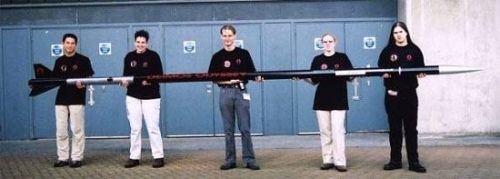London rocket team ready to make bid for new record... next stop space - Sept. 10, 2002
Two years ago the London based MARS Advanced Rocketry Group, one of the UK's longest running amateur rocketry organisations, set a new UK and European amateur rocket altitude record when a team of rocketeers flew out to the Black Rock Desert in Nevada, USA, and successfully launched the Phobos EAV amateur rocket to almost 35,0000ft (10 1/2 kilometres) above the Earth's surface.
That last record-breaking rocket used a solid rocket motor designed and developed in the USA. The team are now ready to break the record again... with an entirely British built rocket motor, twice the size of the last.
The MARS team have spent the last 5 years developing a new kind of rocket motor called a hybrid rocket motor, and the last 2 years developing the hybrid rocket motor that will power the latest MARS rocket. A hybrid rocket motor uses half liquid oxidiser and half solid fuel. The hybrid rocket motor that the MARS team have been developing uses liquid Nitrous Oxide (laughing gas) as its source of oxygen and solid polyethylene (carrier bag material) as its fuel.
This hybrid system has massive safety advantages over solid rocket motors normally used by amateurs, because the hybrid fuel is so inert. The system is also extremely environmentally friendly in comparison with other forms of rocket fuel... the main exhaust products from the motor are nitrogen and water. The system is also incredibly cheap... where other amateur groups boast about how expensive their rockets are... MARS are proud to be achieving these feats on a shoe-string budget. The propellant for one launch of the new rocket costs just £300, one tenth of the cost of a solid fuel rocket motor of similar performance.
The hybrid motor has been static tested on the ground at MARS's secure, private static test facility, and, when the team's plans to fly out to the USA last September to test fly the motor in the desert were dashed by the September 11th tragedy, it was instead test flown to over a mile in altitude in a remote part of Scotland last November. All the tests of this latest MARS hybrid rocket motor (both flight and static) have been successful.
The new MARS rocket is called Deimos Odyssey, inspired by the film 2001 (the year the rocket was originally meant to fly). The rocket is built from aluminium, carbon fibre and fibreglass and stands over 24ft tall. A second backup vehicle of the same construction as the first, and using the same hybrid rocket motor, will also be taken out for the latest launch.
The rocket's hybrid motor is designed to give around a quarter of a ton of thrust for a total burn time of over 25 seconds, and should lift the rocket to well in excess of the team's last record of 35,000ft.
The rocket will carry onboard a series of still and video cameras for general footage and also for remote sensing experiments, flight computers, engine management system, altimeter/accelerometers, location beacons, telemetry systems, onboard GPS location systems, an atmospheric sounding payload, and, thanks to the advanced equipment supplied by the team's sponsors, the team hope to receive live high resolution video transmitted back from the rocket as it travels up through the upper layers of the atmosphere and then send these images back to the teams UK headquarters by satellite link.
The MARS team have been working towards the goal of launching an amateur rocket into space for the last five years by building and testing ever larger and more complex test rockets. This launch, if successful, should be the last flight test needed before the team make a bid to become the first amateurs to ever launch a rocket into space (although the opportunity for more test flights may be taken, of course). A space bid would require a scaled up version of this rocket, over four times as powerful - with work having already started on this follow on vehicle. The MARS ethos is to continually build and test, build and test, and build on the foundations laid by our previous launches - an ehtos that has proved to be very successful.
Fierce competition over recent years has seen attempts by teams from around the world to become the first into space, but so far no one has succeeded. The MARS team believe their camaraderie, team spirit and determination could be the factors that make them the first team to succeed.
The MARS team are currently making preparations for the launch. The launch is due to occur on Friday the 20th or Saturday the 21st of September (dependent on launch conditions and ground support considerations). Due to the remoteness of the desert launch site the team will be in intermittent contact once in the USA.
Updates will be made to with a news-feed from the desert to the MARS teams website at:
For more information on this exciting project, please contact:
info@mars.org.uk

Deimos-Odyssey high altitude, hybrid powered rocket, ready for flight, & on display at the Tomorrow's World Roadshow.










